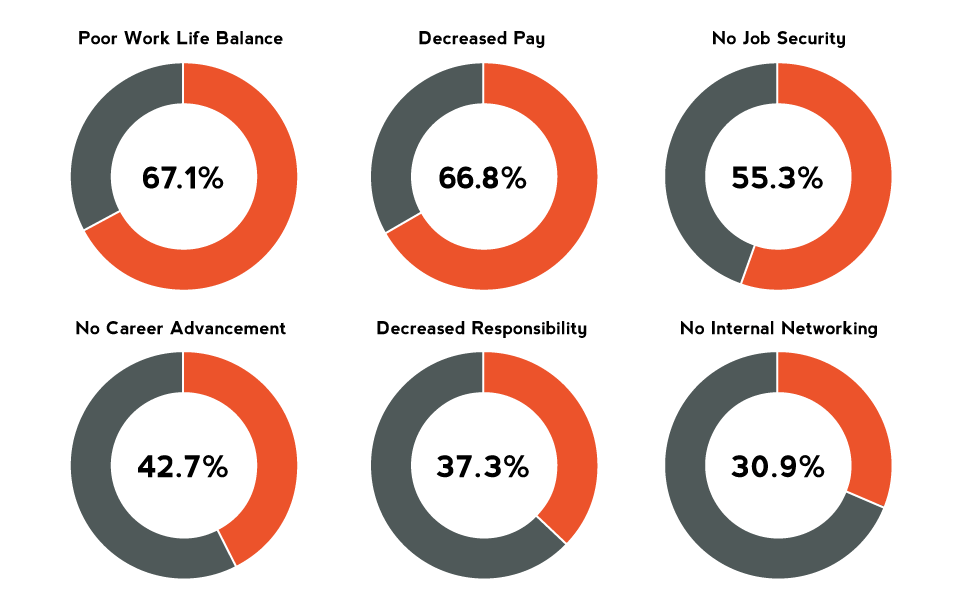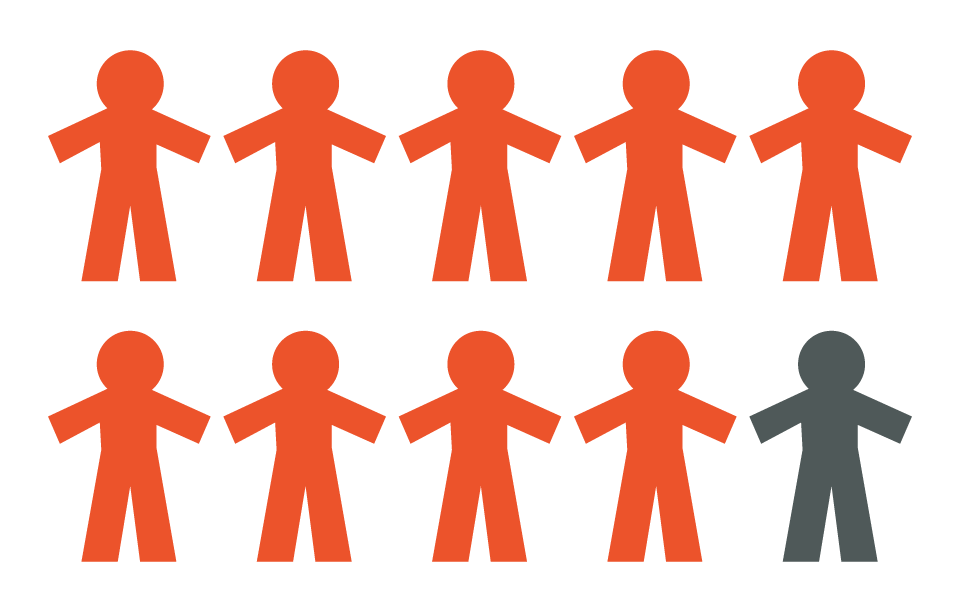Report
The importance of work-life balance

Given the strong local economy in the Washington, D.C. area, local employers must continuously evaluate and improve the culture and benefits of their organizations in order to attract and retain top talent. One increasingly important and successful set of tools have been programs that promote a better work-life balance for employees. Eagle Hill recently conducted a survey that found employees in the D.C. area are especially sensitive to changes in work-life balance, and will remain loyal to employers who give them the tools and flexibility to be successful in both their work and personal lives.
WHAT IS “WORK-LIFE BALANCE”?
Through a broad lens, we simply define work-life balance as the healthy blend of an employee’s professional and personal responsibilities. It’s about being able to make the two work together over the long term, understanding that on any given day, employees may not fully “balanced” one way or the other. Rather, positive work-life balance means employees have the control and flexibility to be successful on both fronts. While many national surveys have been conducted examining trends in work-life balance, little data exists surrounding the Washington, D.C. region. In May 2014, Eagle Hill polled 400 D.C.-area employees about work-life balance.
SO WHY DOES WORK-LIFE BALANCE MATTER?
Above all, our survey highlighted that positive work-life balance is the product of greater flexibility—employees want greater control of their work and their schedules. Additionally, respondents said work-life balance is the number one consideration in evaluating overall satisfaction with their current job. In our D.C.-area survey, across industries, age groups, and job tenure, nearly two thirds of all employees (64%) agreed: work-life balance is the most important factor for defining overall professional satisfaction. Surprisingly, work-life balance ranked ahead of both job security (59%) and compensation (54%).
As employees feel strongly about work-life balance, it will positively or negatively impact engagement, productivity, and retention for organizations. As employees feel their contributions, time, and lives are valued, they are more likely to be engaged in their work. And as a result, their productivity will increase—impacting your performance and bottom line.
Most of all, employees have indicated that they will stay (or leave) for their work-life balance. Not only did our D.C.-area survey respondents list work-life balance as their top consideration, they also identified poor work-life balance as the number one element that would make them leave their current company—also above compensation. Notably, over 56% of employees who reported poor work-life balance said they are likely to leave their jobs this year, whereas only 20% of those with positive work-life balance planned to switch employers.

Respondents revealed poor work-life balance (67.1%) as the number one element that would make them leave their current company—above compensation (66.8%) and job security (55.3%).
In other words: poor work-life balance leads to attrition. As we know, there are significant costs associated with attrition and high employee turnover, including lost productivity, organizational knowledge, intellectual capital, as well as the costs of hiring, onboarding, and training a new employee. On the contrary, there are tremendous gains to be made by companies with an effective work-life balance program. It is estimated that companies effectively managing work-life strategies can increase employee retention by 33%. Work-life programs not only drive employee engagement and happiness, they directly impact our business performance and costs. Increased retention drives higher productivity, and results in fewer company dollars spent to onboard and train new employees. Often, it is the best employees—those we can least afford to lose—who have the most employment options and choose to leave. In order to keep top employees on board, successful employers need to build programs that acknowledge, encourage, and incorporate the growing employee desire for work-life balance.
HOW WILL DEMOGRAPHIC SHIFTS IMPACT WORK-LIFE BALANCE?
Many studies show that the Millennial generation entering today’s workforce believe they truly can “have it all”—a rewarding job, a flexible work environment, and a strong personal life outside of work. They are attracted to companies with policies promoting work-life balance, unwilling to sacrifice their personal lives for excessive work demands, and becoming increasingly likely to leave jobs with poor work-life balance. Further, national studies show that Millennials do not have the same views of loyalty to their employers as in the past, and they are not afraid to leave for more attractive opportunities. While the average job tenure in the United States is 4.6 years, Millennials are now leaving their jobs every 2.3 years. 73% of the workforce under age 35 has spent less than 3 years in their current position, and nationally, 60% of working Millennials plan to leave their job within the first three years of being hired. In our local survey, 41% of those under 25 said they were likely to leave this year. This generation is expected to compose more than 75% of the workforce by the year 2022!
WHAT SHOULD YOUR ORGANIZATION DO?
Governments, companies, and nonprofits across the globe are beginning to understand and respond to the demand for greater work-life balance, which is expected only to increase over the next decade. Once viewed as a women’s issue only, work-life balance (or “integration” ) is now a central driver of career success and job choices for both men and women, and therefore, an essential consideration for organizations. For the future success of our businesses, organizations must explore new strategies to actively help employees achieve meaningful success—in both their professional and personal lives.
EAGLE HILL WASHINGTON D.C. SURVEY
Eagle Hill recently conducted a D.C.-area employee satisfaction survey, polling residents about topics such as views of career success, workplace engagement, tenure, and work/life balance.
WHEN
Spring 2014
WHERE
Washington, D.C. Metro Area
WHO
Sample of 389 professionals across multiple industries
SurveyMonkey
30%
Communications and Relationship Building
31%
Feedback and Recognition
42%
Professional Development and Career Growth
44%
Company Culture and Values
46%
Responsibility, Autonomy, and Independence
54%
Compensation and Pay
59%
Job Security
64%
Work-Life Balance
According to respondents, work-life balance (64%) is the most important factor for defining overall professional satisfaction, ranking ahead of both job security (59%) and compensation (54%).


